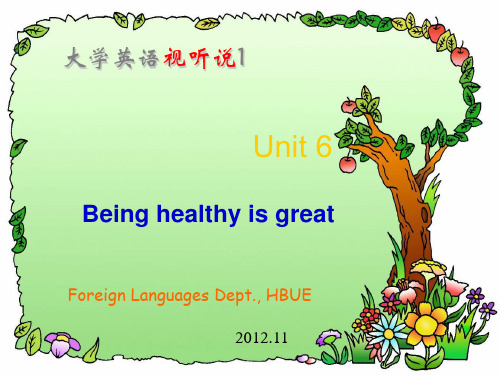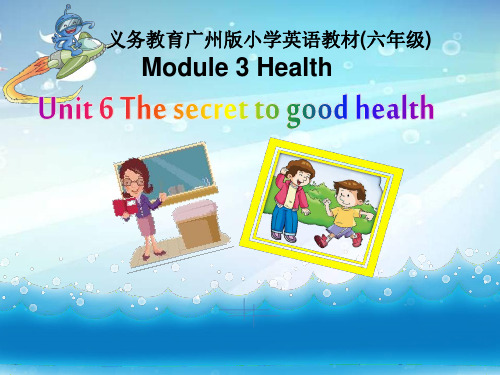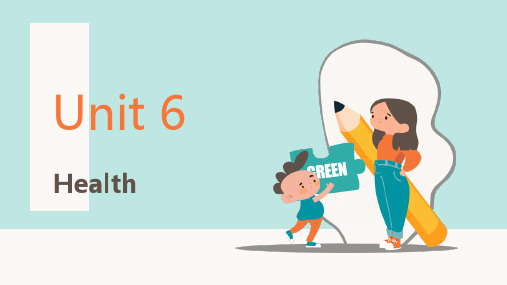UNIT 6 1-2 Health
- 格式:ppt
- 大小:671.50 KB
- 文档页数:14


新版外研社版英语七(上)Unit6知识点汇总一.词性变形1.leaf(n叶子)(pl. leaves)2.nature(n.大自然)去e+al(形容词后缓) =natural(adj.自然的)3.sun(n.太阳)+light(n.光)= sunlight(n.阳光)sun(n.太阳)+flower(n.花)=sunflower(n.向日葵)tea(n.茶)+house(n.房子)=teahouse(n.茶馆)4.produce(v. 生产)——product(n.生成物)二.重点短语1.within a plant在植物工厂内部2.send up送上来3.rise up to上升到4.mix..and..把...和...混合5.mean a lot to..对...来说很重要6.on earth 在世上7.more than +n.不仅仅8.the green workshop绿色车间9.turn..into把...变成..10.take a raincoat穿雨衣11.look up 1.向上看2.查阅12.at the top of..在...的顶端13. the importance of .....的重要性14.around the world全世界15. in different ways 以不同的方式16. be used to do sth.被用来做某事17.be good for对...有益18. the most popular最受欢迎的19.a key part of....非常重要的部分20.not only..but also..不但...而且21.as many..as..和...一样多22. take sb. to sp.带某人到某地23.drink tea 喝茶24.study abroad 出国留学25.most of....中的大部分26.green tea 绿茶27.a cup of warm tea一杯热茶28.make sb. do sth.使某人做某事27.feel like感觉像28. afternoon tea下午茶29.all day整天30.every weekend每个周末e back回来32.black tea 红茶三.考点精析1.plant的用法: v.种植n. a.植物b.工厂2.within的用法within:prep.1)在(建筑或地区)内部within the building在建筑物内部2)在(某段时间)之内within three weeks三周之内3).在(某段距离)之内within three kilometers不到三千米3.时间表达法1)整点:基数词+o'clock2)直接表达法:时在前,分在后,从左往右依次读3)间接表达法:分在前,时在后小于30分钟:分钟+past+时钟(past=过);大于30分钟:(60-原分钟数)+to+原小时+1(to:差);等于30分钟: half past+时钟[注意]fifteen可以用 a quarter 替换; quarter:一刻钟;十五分钟 eg:eight thirty八点半;eight fifteen 八点十五;eight forty-five 八点四十五(直接法)fifteen past eight八点十五;fifteen to nine八点四十五(间接法)4.几个表示“穿着;戴着”的表达 wear:强调穿的状态put on:强调穿的动作dress:穿...衣服,后跟人/反身代词in:穿着衣服的颜色,后加颜色5.send的用法send:发送;寄send sb. sth.=send sth. to sb.寄某物给某人send sb. to sp.派某人去某地 send up a.送上来b.发射;射出6.other/ the other/ the others/another区别other+可数名词复数,“其他的”the other+名词单数(此时范围就是两个常常用one..the other的搭配,指两者中的另外一个)the other+可数名词复数(名词可省略),表示某范围中所有其余的(特指)=the othersanother:+单数名词(常省略或用one代替),指(三个或以上中的)另一个7.explain的用法explain=v.解释;说明 explain sth.解释/说明某事explain sth. to sb.向某人解释某事[注意]explain不能跟双宾语,不能说 explain sb. sth.explain +从句,解释…explanation=n.解释;说明;阐述8. Could you (please)+V原..?请你...好吗?,这是礼貌地提出请求的用语,please可以放在前面,也可以放在句末,还可以省略。




《Health and Fitness Listening and Speaking》教学设计方案(第一课时)一、教学目标1. 学生能够理解并基本掌握与健康和健身相关的词汇和表达方式。
2. 学生能够听懂并简单描述健康和健身相关的主题。
3. 学生能够用英语进行简单的健康和健身相关的对话。
二、教学重难点1. 重点:理解和运用与健康和健身相关的词汇和表达方式,能够进行简单的健康和健身相关的对话。
2. 难点:运用英语进行深入的健康和健身相关的讨论。
三、教学准备1. 准备健康和健身相关的词汇卡片和听力材料。
2. 准备一些健康和健身相关的图片或视频素材。
3. 邀请一位有健身经验的学生作为小老师,协助组织课堂互动。
4. 安排一个健身房或体育馆的参观行程,作为课程的后续活动。
四、教学过程:1. 热身活动(Warm-up Activities)在上课之初,教师可以播放一些关于健康和健身的英文歌曲或视频,如《You Are My Sunshine》、《Take Me to Your Heart》等,以调动学生的积极性,活跃课堂气氛。
接着,教师可以让学生分享自己的健康生活方式,例如饮食习惯、运动习惯等,以及健康对个人生活的影响。
这个环节有助于拉近师生之间的距离,为接下来的教学内容做好铺垫。
2. 听力训练(Listening Training)接下来,教师可以通过播放一段与健康和健身相关的对话或短文,让学生进行听力训练。
在听力过程中,教师可以设置一些问题或填空任务,引导学生关注听力内容。
听力结束后,教师可以让学生分享自己的听后感,提出疑惑或观点,为接下来的口语训练做好准备。
3. 口语训练(Speaking Training)在听力训练之后,教师可以组织学生进行口语训练。
首先,教师可以让学生分组讨论健康和健身的重要性以及如何保持健康和健身。
接着,教师可以邀请学生自愿上台进行口语展示,分享自己的健康观念和健身经验。
教师对学生的口语展示进行点评和指导,帮助学生提高口语表达能力。
六年级上册英语单词表1~6单元人教版全文共3篇示例,供读者参考篇1Sixth Grade English Vocabulary List (Units 1-6)Unit 1: Getting to Know You1. introduce (v.) - to make known by name to another2. greet (v.) - to meet or acknowledge someone with a word or sign of welcome3. conversation (n.) - informal talk involving exchange of news, ideas, or opinions4. colleague (n.) - a person with whom one works, especially in a profession or business5. acquaintance (n.) - a person known to one, but usually nota close friendUnit 2: Around the City1. downtown (adj.) - in or to the central part of a town or city2. suburbs (n.) - residential areas on the edge of a city or large town3. traffic (n.) - vehicles moving on a road or street4. pedestrian (n.) - a person walking rather than travelling ina vehicle5. landmark (n.) - a distinctive feature to identify a placeUnit 3: School Days1. classroom (n.) - a room in a school where students have lessons2. assignment (n.) - a task or piece of work assigned to someone as part of their job or course of study3. principal (n.) - a person in charge of a school4. laboratory (n.) - a room or building equipped for scientific experiments, research, or teaching5. experiment (n.) - a scientific procedure undertaken to make a discovery, test a hypothesis, or demonstrate a known factUnit 4: Family and Friends1. relative (n.) - a person connected by blood or marriage2. sibling (n.) - brother or sister3. generation (n.) - all of the people born and living at about the same time4. relationship (n.) - the way in which two or more people or things are connected5. celebrate (v.) - to acknowledge a significant or happy day or eventUnit 5: At the Restaurant1. waiter/waitress (n.) - a person who serves food and drinks in a restaurant2. menu (n.) - a list of dishes available in a restaurant3. bill (n.) - a statement of the total cost of a meal in a restaurant4. reservation (n.) - an arrangement to have a table at a restaurant at a specific time5. tip (n.) - a small amount of money given to awaiter/waitress for good serviceUnit 6: Health and Fitness1. exercise (n.) - physical activity that is good for your health2. nutrition (n.) - the process of providing or obtaining the food necessary for health and growth3. balance (n.) - a state of equilibrium4. strength (n.) - the quality or state of being physically strong5. healthy (adj.) - in a good physical or mental stateLearning these words will enhance your vocabulary and enable you to communicate effectively in various situations. Keep practicing and expanding your English vocabulary!篇2Title: English Vocabulary List for Grade Six, Book One to Book Six, People's Education EditionGrade six English is an important stage in learning English. In order to help students improve their English vocabulary, the following is a list of words from the first six units of the textbook. These words are essential for students to grasp in order to have a solid foundation in English.Unit One:1. Hello2. Goodbye3. Please4. Thank you5. Yes6. NoUnit Two:1. Mother2. Father3. Sister4. Brother5. Grandma6. Grandpa Unit Three:1. Family2. Friend3. Cousin4. Aunt5. Uncle6. Classmate Unit Four:2. Student3. Principal4. Librarian5. Nurse6. Doctor Unit Five:1. Book2. Pen3. Pencil4. Desk5. Chair6. Classroom Unit Six:1. School2. Library3. Hospital5. Store6. ParkBy mastering the vocabulary from these six units, students will be able to communicate more effectively in English. It is important to practice these words regularly in order to build fluency in speaking and writing. Good luck with your English studies!篇3Sixth Grade English Word List for Units 1-6 People's Education Press VersionUnit 1: greetings, introducing yourself, asking about someone's name, and school subjects1. Hello - used as a greeting or to begin a conversation2. Hi - informal way of saying hello3. Good morning - a polite greeting used in the morning4. Good afternoon - a polite greeting used in the afternoon5. Good evening - a polite greeting used in the evening6. Goodbye - used to say farewell7. My name is... - used to introduce yourself8. What's your name? - used to ask someone's name9. Math - a school subject that involves numbers and calculations10. Science - a subject that studies the natural world11. English - the study of the English language12. History - the study of past events13. Geography - the study of the Earth's features and peopleUnit 2: family members, describing people, and likes/dislikes1. Mother - female parent2. Father - male parent3. Brother - male sibling4. Sister - female sibling5. Grandmother - mother's mother6. Grandfather - mother's father7. Aunt - sister of one's parent8. Uncle - brother of one's parent9. Cousin - a child of one's aunt or uncle10. Tall - higher than average height11. Short - lower than average height12. Slim - having a thin and healthy body13. Happy - feeling pleasure or contentment14. Sad - feeling sorrow or unhappiness15. Love - a strong feeling of affectionUnit 3: animals, describing animals, and habitats1. Dog - a domestic animal often kept as a pet2. Cat - a small domesticated carnivorous mammal3. Bird - a warm-blooded vertebrate animal with feathers4. Fish - a cold-blooded aquatic animal with gills5. Lion - a large carnivorous feline6. Elephant - a large mammal with a long trunk7. Giraffe - a tall mammal with a long neck8. Monkey - a small to medium-sized primate9. Polar bear - a large white bear that lives in cold regions10. Fast - moving at high speed11. Slow - moving at low speed12. Wild - living in a natural environment13. Domestic - tamed and kept as a pet14. Forest - a large area covered chiefly with trees and undergrowthUnit 4: food and drinks, ordering in a restaurant, and preferences1. Apple - a round fruit with red or green skin2. Banana - a curved fruit with yellow skin3. Orange - a round citrus fruit with a tough orange skin4. Rice - small granular grains used as food5. Noodles - long, stringy strips of pasta6. Pizza - a round flatbread topped with cheese and other ingredients7. Hamburger - a flat round patty of ground meat in a bun8. Juice - a liquid extracted from fruits or vegetables9. Water - a transparent, tasteless, odorless liquid10. Coffee - a drink made from roasted coffee beans11. Tea - a hot drink made from steeping dried tea leaves in water12. Milk - a white liquid produced by mammals13. Sweet - having a pleasant taste of sugar14. Salty - containing or tasting of salt15. Spicy - having a strong and pungent flavorUnit 5: daily routines, telling time, and leisure activities1. Wake up - stop sleeping and become conscious2. Brush teeth - clean teeth with a toothbrush and toothpaste3. Have breakfast - eat the first meal of the day4. Go to school - attend classes and learn5. Do homework - complete assigned schoolwork outside of class6. Watch TV - view television programs7. Play games - participate in recreational activities8. Read books - look at and understand written or printed material9. Have lunch - eat the midday meal10. Take a nap - rest for a short time during the day11. Dinner - eat the evening meal12. Bedtime - the time to go to bed and sleep13. hours - units of time equal to sixty minutes14. minutes - units of time equal to sixty seconds15. leisure - free time not taken up with work or dutiesUnit 6: weather, seasonal activities, and clothing1. Sunny - having bright sunlight2. Cloudy - covered with clouds3. Rainy - experiencing rainfall4. Snowy - covered with snow5. Windy - having a lot of wind6. Hot - having a high temperature7. Cold - having a low temperature8. Spring - the season between winter and summer9. Summer - the warmest season of the year10. Fall - the season between summer and winter; also known as autumn11. Winter - the coldest season of the year12. Jacket - a short coat13. Sweater - a knitted garment for the upper body14. Boots - a type of shoe that covers the foot and ankle15. Scarf - a length of fabric worn around the neckThis word list is designed to help sixth graders expand their English vocabulary and improve their language skills. Mastering these words will enable students to communicate effectively in various everyday situations and enhance their understanding of spoken and written English.。
Unit 2 Health and FitnessWords and Expressionsactive /ˈæktɪv/ adj. 好动的;活跃的actually /ˈæktʃuəli/ adv. 事实上appointment /əˈpɔɪntmənt/ n. 预约boost /buːst/ v. 使增长;使兴旺cancer /ˈkænsə(r)/ n. 癌症cough /kɒf/ n. 咳嗽cure /kjʊə(r)/ n. 药物;疗法depression /dɪˈpreʃ(ə)n/ n. 抑郁develop /dɪˈveləp/ v. 患(病);发展effort /ˈefət/ n. 气力;努力energy /ˈenədʒi/ n. 精力fitness /ˈfɪtnəs/ n. 健康handle /ˈhændl/ v. 处理;应付ignore /ɪɡˈnɔː(r)/ v. 忽视;不理睬illness /ˈɪlnəs/ n. 疾病manual /ˈmænjuəl/adj. 靠劳力的;手工的physical /ˈfɪzɪkl/ adj. 肉体的;身体的reduce /rɪˈdjuːs/ v. 使变小sadly /ˈsædli/ adv. 令人遗憾地;不幸地self-respect /ˌself rɪˈspekt/ n. 自尊(心)stress /stres/ n. 精神压力;压力suffer /ˈsʌfə(r)/ v. 经受(痛苦);遭受technician /tekˈnɪʃn/ n. 技术人员temperature /ˈtemprətʃə(r)/ n. 体温;温度terrible /ˈterəbl/ adj. 可怕的;糟糕的as a result 结果burn off 燃尽;烧掉give sb a hand 帮忙look well 看上去健康;显得不错lose one’s temper 发脾气move around 走来走去public transport 公共交通recover from 恢复suffer from 忍受;遭受washing machine 洗衣机what is more 而且Listening and SpeakingLi Xiaomei: Hi, Jack. You don't look well, What's wrong with you?Jack: Hi, Xiaomei. Actually, I don't know what's wrong with me. I just feel very tired and get angry quite often.Li Xiaomei: How long have you been like this?Jack: For about 2 weeks.Li Xiaomei: Hmmm…are you busy recently?Jack: Yes, indeed. And there is a lot of work to be finished by the end of this weekend.Li Xiaomei: I see, It seems that you are under great pressure now. Why not ask your co-workers for help? It's the team that could work wonders.Jack: Oh, yes. You're right. They can give me a hand.Li Xiaomei: And don't forget to see a doctor when you are not feeling well, It's easy to make an appointment online with your smart phone.Jack: Yes, I will. Many thanks!参考译文:李小梅:你好,杰克。